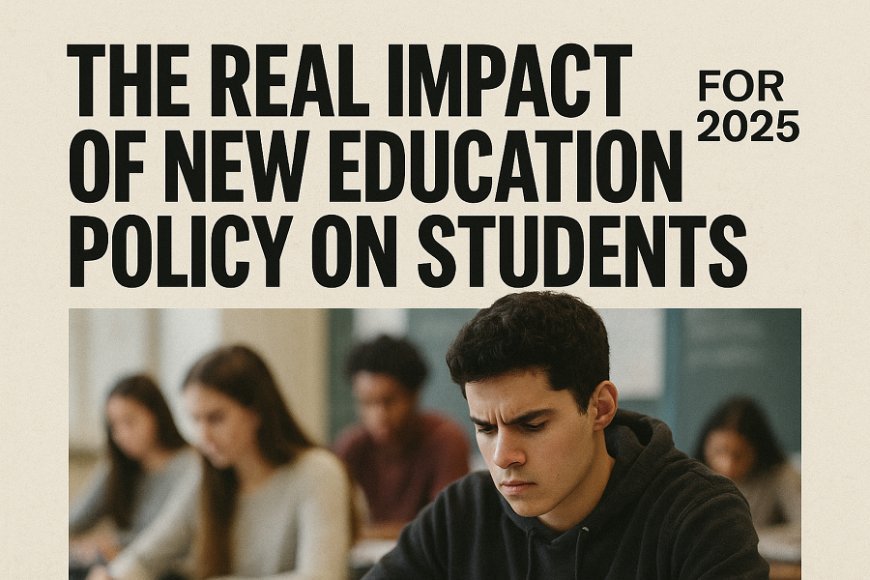The Real Impact of New Education Policy on Students for 2025
The New Education Policy (NEP) 2020 is like a big, exciting new plan for schools and colleges in India. Imagine your old school bag, full of heavy books that you sometimes didn't quite understand.

The New Education Policy (NEP) 2020 is like a big, exciting new plan for schools and colleges in India. Imagine your old school bag, full of heavy books that you sometimes didn't quite understand. Now imagine a new bag, lighter, with fun tools, and books that help you learn things you actually care about. That's kind of what NEP wants to do for students.
Let's break down how this new policy is going to affect you, in simple words. Read Full PDF
What is the New Education Policy (NEP) 2020?
Think of NEP 2020 as a fresh start for education in India. The main idea is to make learning more fun, useful, and something that helps you grow into a well-rounded person, not just someone who memorizes facts for exams. It wants to prepare you for the real world, with all its new jobs and challenges.
Read More: Kanyashree Status Check Online 2024, www.kanyashree.gov.in Payment Status For k1,k2, k3
Big Changes in School Structure
Remember how we always had 10 years of school and then 2 years of junior college (10+2 system)? Well, NEP is changing that!
- New Stages of Learning (5+3+3+4):
- Foundational Stage (5 years): This is for your really early years, from ages 3 to 8 (Nursery to Class 2). It's all about playing, discovering, and learning basic things like reading, writing, and numbers in a fun way.
- Preparatory Stage (3 years): This is for Classes 3 to 5 (ages 8-11). You'll start learning more formal subjects like language, maths, science, and social studies, but still with lots of activities and hands-on learning.
- Middle Stage (3 years): This covers Classes 6 to 8 (ages 11-14). Here, you'll go deeper into subjects and start exploring different topics, maybe even some vocational skills like coding.
- Secondary Stage (4 years): This is for Classes 9 to 12 (ages 14-18). This is where you get more freedom to choose what you want to study.
This new structure is designed to make sure you learn things at the right age and in a way that helps you understand them better, rather than just cramming.
Learning What You Love (No More Strict Streams!)
One of the coolest things about NEP is that it's saying goodbye to the old idea of "streams" like Science, Commerce, or Arts.
- Choose Your Own Subjects: Imagine you love science but also enjoy painting, or you're good at maths but also want to learn about music. Earlier, you had to pick one stream. Now, NEP allows you to choose subjects from different areas. So, you could study Physics, along with Fine Arts, and maybe a bit of Business Studies! This makes your learning more exciting and personal.
- Skills for the Real World: The policy really wants you to learn practical skills, not just theory. This means more focus on things like vocational education (learning a specific trade or skill), internships, and projects. You'll get to learn things that can actually help you in a job someday, even while you are still in school.
Exams Will Be Less Scary
We all know the pressure of exams, right? NEP aims to make them less stressful.
- More Than Just One Big Exam: Instead of just one big exam at the end of the year, there will be more regular, smaller assessments throughout the year. This helps your teachers understand what you're learning continuously, and it takes away the pressure of that one final, make-or-break test.
- Understanding, Not Rote Learning: The focus will be on whether you truly understand concepts, not just if you can memorize them. This means more questions that make you think, solve problems, and be creative.
- Board Exams Twice a Year: For Classes 10 and 12, there's a plan to have board exams twice a year. This means if you don't do well the first time, you get another chance to improve your score, which is a big relief!
Learning in Your Own Language
- Mother Tongue Power: The policy encourages teaching in your mother tongue or local language, especially in the early grades (up to Class 5, and ideally till Class 8). This is because it's easier to understand new ideas when they are explained in a language you speak at home. This can help you build a strong foundation.
Teachers Will Be Even Better
NEP also focuses on making teachers even more skilled. They will get better training and learn new, fun ways to teach so that you can learn better.
Challenges Along the Way
No big change is easy, and NEP also has some challenges:
- Money Matters: Making all these changes needs a lot of money to build new classrooms, train teachers, and buy new tools.
- Digital Divide: While NEP wants to use a lot of technology in learning, not everyone has access to computers or good internet, especially in villages. This can create a gap.
- Training Teachers: Teachers need to be trained in new ways of teaching, which takes time and effort.
- Making Everyone Agree: India is a big country with many different states. Getting everyone to agree and implement the policy in the same way can be tough.
The Real Impact
Ultimately, the New Education Policy wants to make education in India more modern, enjoyable, and helpful for every student. It wants to help you:
- Think for Yourself: Not just remember facts, but think critically and solve problems.
- Be Creative: Encourage your unique talents and ideas.
- Learn Skills for Life: Prepare you for different jobs and challenges in the future.
- Be a Good Person: Focus on values, ethics, and being a responsible citizen.
The NEP is a journey, and it will take time for all these changes to fully happen. But the aim is to create a generation of students who are curious, smart, and ready for whatever the future holds!
